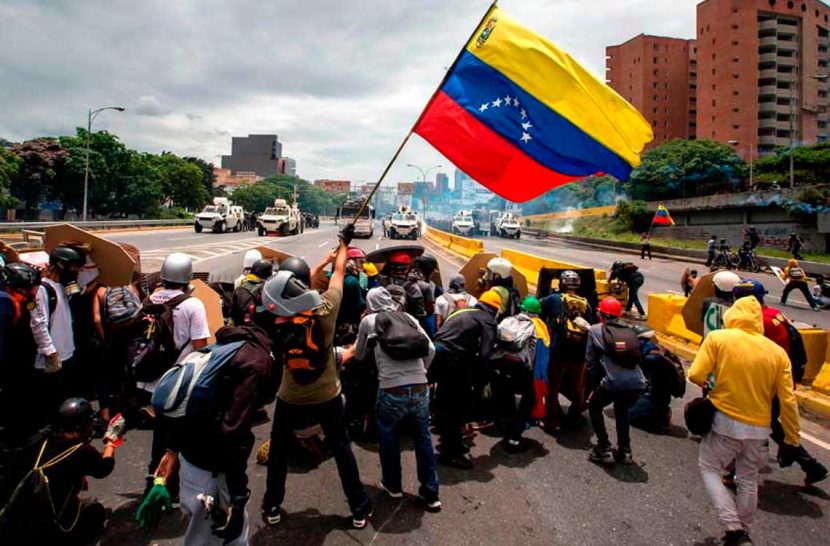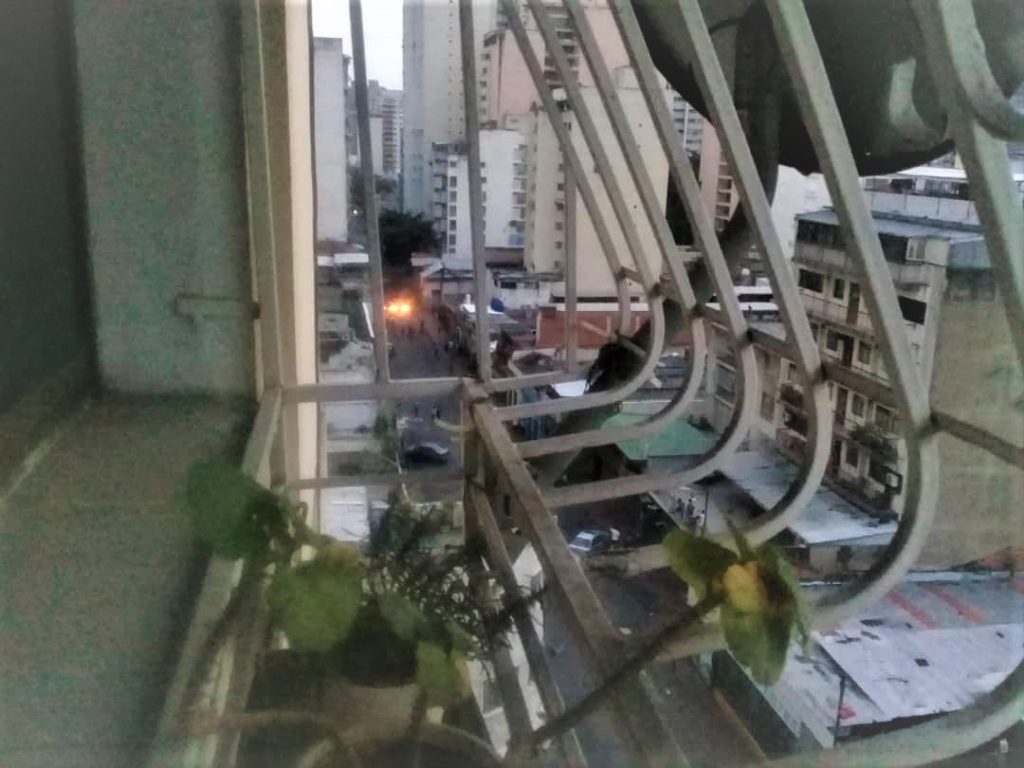
Four days of blackouts: My uphill journey in Venezuela
CARACAS – Arriving in Venezuela on March 8 was dramatic. The sadness of leaving my family and not knowing with certainty when I would see them again quickly overtook me. I had never seen an airport as quiet as Simón Bolívar that Friday. At that moment I only had a vague idea of what was happening. My neighbor in Caracas had written to me the previous afternoon informing me that since 4:30 p.m. on Thursday, there was no light in the house.
On the way to the bus that would take us to our apartment, my soul hit the floor: there were hundreds of people who looked exhausted and sleeping on top of their luggage. At that moment we began to despair.
Caracas did not look like Caracas. There was something similar to silence. Although the people were on the street, it was not like other days when the music, the screams and the noise of the cars make you dizzy. And, for a change, people were sitting by the front doors of their houses. In conversation! The same neighbor who had advised us the day before explained what had happened: the blackout was due to a failure at the El Guri hydroelectric plant, which meant that 70 percent of the national territory was without electricity.
Intents to protest (or guarimba)
Saturday morning was like waking up on Christmas. The light had arrived! As always, people from elsewhere had over the top information and asked if we were alive and how the war was unfolding. The truth was that there had been no armed confrontation and people were busy shopping, charging cell phone batteries and computers, or glued to their televisions.
Government officials reported that El Guri had been sabotaged and was working to get everything back to normal as quickly as possible. The opposition —as usual— said that everything was Maduro’s fault and that the light would return when he abdicated power. Meanwhile, people were stocking up with what was necessary to survive that day.
Via the radio on our cell phone we learned that the electrical system had been attacked again. A bit after noon we were again out of power. What had taken two days to fix was down again. And this time things were more serious because there was no light or telephone service.
We live in La Candelaria, a Caracas neighborhood populated by migrants from Spain, Portugal and Italy. Here, a service economy fostered the strengthening of these migrants and their families as a well-to-do middle class. It is a neighborhood where, even with the current economic crisis, you can find everything. Mainly anti-chavistas.
That Saturday afternoon was different. The noise of pots and pans began to sound and the ‘escualidos’ (chavismo opponents) shouted the new slogan going around since January 23 when [Juan] Guaidó self-proclaimed himself interim president: “Maduro, screw your mother.”
It made us laugh. But everything stopped being funny at 6 p.m. when it started getting dark.
 About two blocks from our building they staged their the first guarimba attempt. It was my first guarimba experience since my partner and I arrived in Venezuela in 2018. We witnessed it from our special corner. However, the riot police arrived and quickly disbanded the rabble-rousers when a tank rolled over burning tires. From a terrace nearby one of the boys who lives there shouted at the supposed guarimberos, “Do not flee, cowards!” It was a fairly typical image of the opposition in this country: It calls for violence to “overthrow the regime,” but rarely risks any skin in the fight.
About two blocks from our building they staged their the first guarimba attempt. It was my first guarimba experience since my partner and I arrived in Venezuela in 2018. We witnessed it from our special corner. However, the riot police arrived and quickly disbanded the rabble-rousers when a tank rolled over burning tires. From a terrace nearby one of the boys who lives there shouted at the supposed guarimberos, “Do not flee, cowards!” It was a fairly typical image of the opposition in this country: It calls for violence to “overthrow the regime,” but rarely risks any skin in the fight.
At this point I felt totally at ease with my neighbor and went into her house for a better view. The guarimberos had now changed corners. There were about four of them that one could see had weapons. Also, about half an hour later, some motorcycles arrived and they stationed themselves in the three corners where you found protestors who were sharing something that they stealthily passed around in the dark. I’m not sure what it was, but I venture to guess it was drugs, because here money or weapons are not usually hidden.
Supposedly the protest had been started by neighbors upset with the country’s situation. The uprising against Maduro had begun! Analyzing issues such as national security in that situation, where there was no communication or transportation, and where hospitals were in a state of emergency, and we had not idea what to do… I believed the uprising had begun. But the guarimbas and the noisy pots and pans bothered us until around midnight. My partner later scoffed, “For having started a popular uprising, these people sure do go to sleep early.”
The next day the streets were strewn with those same guarimberos sprawled on the sidewalks with bottles of champagne in hand. They had looted the liquor stores and in this case showed their real motivations; they had succumbed to their addiction made possible by the right who uses them and the violence of some popular sectors in pursuit of their political ends.
They turned off the light and lit the community
The Sunday and Monday dynamic was a tense calm. Little by little the electric service was returning to several sectors. We were able to meet with friends and family and learn about different experiences occurred during the blackout. They told us unbelievable stories.
There are domestic workers who have been unemployed for months in this country, but in this situation they were essential because many of the homeowners did not even know how their buildings work. Many people cooked communally. They told us how a girl thought that her house was the only one that had a gas stove in the community and invited other families to use her stove for food preparation. Others organized a water search party when the liquid became scarce. They climbed mountains or went to the water source together. They offered the neighbors their cars in case they needed them, putting transportation at everyone’s reach.
Of course, there were those who took advantage of the situation and made the price of food more expensive or started charging a dollar to charge your cell for 10 minutes. We also heard of looting in Zulia, specifically in Maracaibo, where things sounded different.
We were amazed that Venezuelan homes did not have electric lamps, or candles, or flashlights for when the light goes out. Because normally in Caracas electricity never fails. My mother, who is no doubt a Cuban, had put a pack of 12 candles in my suitcase, which I imagined for a more romantic setting, but ended up being distributed among friends. We were also impacted by the despair over the lack of water. When it became the number one priority, luckily, it arrived two days after the electric service.
As a child, in the middle of Cuba’s so-called Special Period, the norm was usually seven or eight hours of electricity. For me, a six-day blackout — of which I only lived four — the story was not so neuralgic. Venezuelans were surprised, but most of all by the community they developed during that period of time, because they thought that they no longer had that capacity.
Leaving Cuba a few weeks back, everyone asked me: “Girl, what are you planning to do in Venezuela?” It is true, life is not easy here and this blackout proved it. In fact, we expect things to become even more difficult. However, with that question asked me I always think of “Mi ciudad” (My City), a song by Cuban musician X Alfonso, which says: “Buddy, why are you returning?” And he’d answer: “This is my city / and I feel good / it’s an international problem.” And at least until this sunrise, Caracas is also my city. No blackout turns it off.

